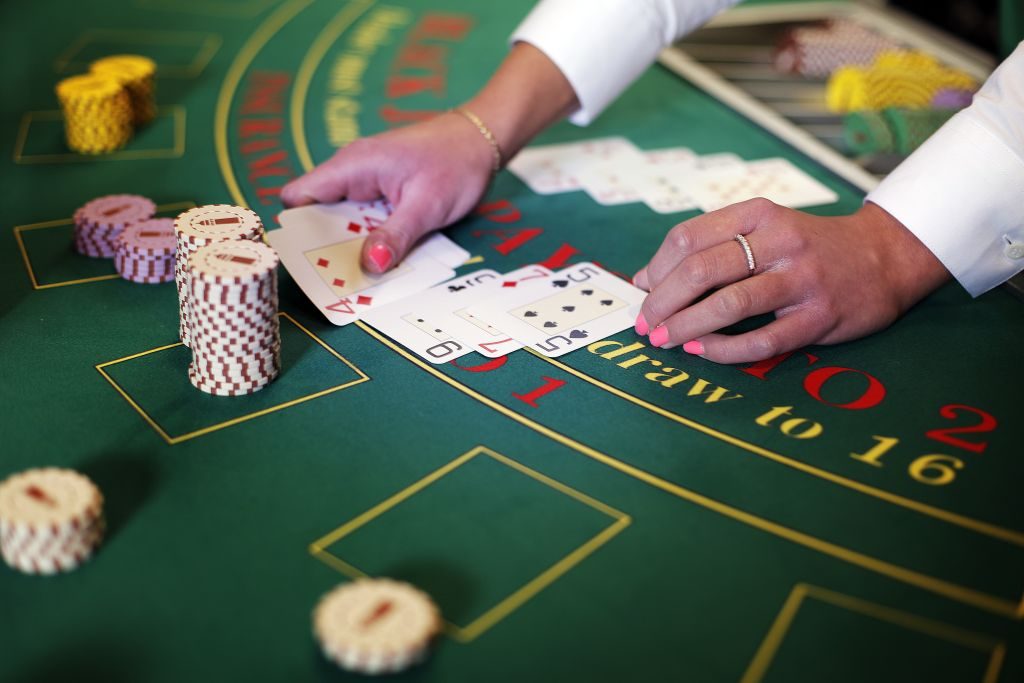Introduction
Does Gambling Affect Your Credit Score: Your credit score is a crucial factor that determines your financial standing and affects your ability to secure loans, credit cards, or favorable interest rates. It reflects your creditworthiness and is influenced by various factors, such as payment history, debt levels, and credit utilization. However, you may wonder if gambling has any impact on your credit score.
While gambling itself does not directly affect your credit score, the financial habits associated with it can have consequences. Gambling is considered a form of entertainment, and if it is approached responsibly, it should not have a significant impact on your creditworthiness. However, if you engage in excessive gambling or rely on credit cards or loans to fund your gambling activities, it can lead to detrimental effects on your credit score.
Using credit cards for gambling purposes can increase your debt load and lead to higher credit utilization, which is a factor in determining your credit score. Additionally, if you are unable to pay off your gambling-related debts, it may result in missed or late payments, negatively impacting your payment history.
In this article, we will explore the potential ways in which gambling can affect your credit score and provide insights on how to maintain a healthy financial balance while enjoying the occasional wager.
What does gambling do to your credit score?
No, gambling won’t show up on your credit history.
Your credit score is based on your ability to borrow money responsibly. And whether you will be able to pay it back. It doesn’t make judgements on how you spend the money you have. So, gambling itself doesn’t have any impact.
Gambling itself does not directly impact your credit score. Your credit score is determined by factors such as payment history, credit utilization, length of credit history, new credit applications, and types of credit used. However, certain financial behaviors associated with gambling can indirectly affect your credit score.
One way gambling can influence your credit score is through the use of credit cards or loans to fund your gambling activities. If you rely heavily on credit to gamble and accumulate significant debts, it can increase your credit utilization ratio, which measures the amount of credit you’re using compared to your total available credit. High credit utilization can lower your credit score.
If you are unable to pay off your gambling-related debts, it can result in missed or late payments, which can negatively impact your payment history. Late payments can stay on your credit report for up to seven years and can significantly lower your credit score.
To protect your credit score, it’s important to engage in responsible gambling practices, establish a budget for entertainment purposes, and avoid relying on credit to fund your gambling activities. By managing your finances responsibly, you can maintain a healthy credit score while enjoying the occasional flutter.

How can I improve my credit score after gambling?
There are many things you can do boost your chances of success when applying for a home loan, even as a serious gambler.
- Stop gambling. It’s obvious advice but still important
- Open a separate account
- Get a clear savings history
- Pay off debt
- Fix your credit history.
If you have noticed a negative impact on your credit score due to gambling-related financial activities, there are steps you can take to improve your creditworthiness:
1. Assess your financial situation: Take a close look at your overall financial picture and identify areas where you may be struggling. Evaluate your income, expenses, and debts to gain a clear understanding of your financial standing.
2. Create a budget: Develop a comprehensive budget that prioritizes essential expenses and allows you to allocate funds towards paying off debts. Stick to this budget strictly to regain control of your finances.
3. Pay off gambling-related debts: Focus on paying off any outstanding debts accumulated from gambling. Make consistent and timely payments to demonstrate responsible financial behavior and reduce your overall debt load.
4. Reduce credit card utilization: Aim to keep your credit card balances low in relation to your credit limits. Lowering your credit utilization ratio by paying down balances can positively impact your credit score.
5. Make payments on time: Ensure all your bills and credit obligations are paid on time moving forward. Consistent and punctual payments contribute to a positive payment history, which is a significant factor in credit scoring.
6. Seek professional advice if needed: If you’re facing significant financial difficulties, consider seeking assistance from a financial advisor or credit counseling agency. They can provide guidance on debt management strategies and help you regain financial stability.
Remember, improving your credit score takes time and discipline. By adopting responsible financial habits, paying off debts, and managing credit wisely, you can gradually rebuild your creditworthiness and improve your credit score.
Does gambling affect credit score?
Gambling doesn’t show up in your credit report and won’t directly impact your credit score. However, lenders, especially mortgage lenders, consider more than your credit report while assessing your creditworthiness.
Gambling itself does not have a direct impact on your credit score. Your credit score is based on factors such as payment history, credit utilization, length of credit history, new credit applications, and types of credit used. However, certain financial behaviors associated with gambling can indirectly affect your credit score.
If you use credit cards or loans to fund your gambling activities and accumulate excessive debts, it can increase your credit utilization ratio. High credit utilization, where you are using a significant portion of your available credit, can lower your credit score.
If you are unable to repay your gambling-related debts and miss payments, it can have a negative effect on your payment history. Late or missed payments can stay on your credit report for several years and significantly impact your credit score.
To protect your credit score, it is important to practice responsible gambling and avoid relying on credit to fund your activities. Establishing a budget for entertainment purposes and managing your finances wisely can help maintain a healthy credit score. If you find yourself in financial distress due to gambling, seeking professional assistance can provide guidance on managing your debts and improving your creditworthiness.
What is credit in gambling?
It’s designed to make the math easier. Credits takes the current amount that’s in the machine and does the math of how many betting units you have based on the denomination. For instance, if you put a $100 bill into a quarters machine, it will display 400 credits.
In the context of gambling, “credit” refers to a form of borrowing or extending credit to a player by a casino or gambling establishment. It allows players to continue playing or betting even if they do not have sufficient funds on hand. The concept of credit in gambling is similar to a line of credit or a loan.
When a player requests credit from a casino, they are essentially asking for the casino to front them a certain amount of money that they can use for gambling purposes. The player is expected to repay the borrowed funds at a later date, typically within a specified timeframe, with or without interest depending on the terms agreed upon.
Credit in gambling can be provided in various forms, such as markers or casino credit lines. Casinos may perform a credit check or assess the player’s financial standing before granting credit. It is important to note that the availability and terms of credit in gambling can vary depending on the jurisdiction and the specific policies of the casino or gambling establishment.
Is gambling bad for your credit score?
Gambling doesn’t show up in your credit report and won’t directly impact your credit score. However, lenders, especially mortgage lenders, consider more than your credit report while assessing your creditworthiness.
Gambling can potentially be bad for your credit score. While gambling itself does not directly impact your credit score, certain consequences of gambling behavior can lead to negative effects on your creditworthiness.
Here are some ways in which gambling can harm your credit score:
1. Accumulating gambling debts: If you borrow money or use credit to fund your gambling activities and are unable to repay those debts, it can lead to delinquencies and collections, which can significantly damage your credit score.
2. Neglecting other financial obligations: Excessive gambling can cause individuals to prioritize gambling over paying bills, loans, or credit card balances, leading to late or missed payments that negatively impact their credit score.
3. Financial instability: Gambling addiction or compulsive gambling can result in financial instability, which may make it challenging to manage your overall finances, including meeting credit obligations.
4. Increased credit utilization: Using credit cards or taking out loans to finance gambling can increase your credit utilization ratio, which compares your credit card balances to your credit limits. High credit utilization can lower your credit score.
5. Declaring bankruptcy: For individuals who amass substantial gambling debts, declaring bankruptcy may be the only option. Bankruptcy can have a severe and long-lasting negative impact on your credit score.
It’s important to exercise responsible gambling habits and manage your finances wisely to avoid potential harm to your credit score and overall financial well-being.

Is there a correlation between gambling and credit scores?
There can be a correlation between gambling and credit scores, although it is not a direct one. The correlation arises from the financial consequences of gambling behavior rather than the act of gambling itself. Here are some ways in which gambling can affect credit scores:
1. Accumulating gambling-related debts: If individuals borrow money or use credit to fund their gambling activities and are unable to repay those debts, it can lead to delinquencies, collections, and negative marks on their credit report, which can lower their credit score.
2. Financial instability: Compulsive gambling or excessive gambling can lead to financial instability, making it challenging for individuals to manage their overall finances and meet their credit obligations. Late or missed payments can negatively impact credit scores.
3. High credit utilization: Using credit cards or loans to finance gambling can increase credit utilization, which compares credit card balances to credit limits. High credit utilization can negatively affect credit scores.
4. Bankruptcy: For individuals with substantial gambling debts, declaring bankruptcy may become necessary. Bankruptcy has a significant negative impact on credit scores and can stay on credit reports for several years.
While gambling itself may not directly influence credit scores, the associated financial behavior and consequences can have a correlation with creditworthiness and credit scores. It is important to exercise responsible gambling habits and manage finances prudently to maintain a healthy credit profile.
How does gambling behavior impact your ability to obtain credit?
Gambling behavior can have an impact on your ability to obtain credit. Lenders and financial institutions consider various factors when assessing credit applications, and gambling behavior can be one of them. Here’s how gambling behavior can affect your creditworthiness and ability to obtain credit:
1. Creditworthiness assessment: Lenders evaluate an individual’s creditworthiness by looking at their credit history, income, debt-to-income ratio, and financial stability. If your gambling behavior has resulted in financial instability, late payments, or accumulated debts, it can raise concerns about your ability to manage credit responsibly.
2. Negative credit history: If your gambling activities have led to unpaid debts, delinquencies, or accounts in collections, it will have a negative impact on your credit history. A poor credit history can make it more difficult to qualify for credit or may result in higher interest rates and less favorable terms.
3. High debt-to-income ratio: Excessive gambling losses can increase your overall debt burden, affecting your debt-to-income ratio. Lenders typically consider this ratio when assessing credit applications, and a high ratio can signal financial strain, potentially leading to credit denial or less favorable credit terms.
4. Risk assessment: Some lenders may view gambling as a potential risk factor. They may associate gambling with impulsive behaviour, financial irresponsibility, or potential future financial problems, which can make them hesitant to extend credit to individuals with a history of gambling behaviour.
While gambling behaviour itself may not be the sole determining factor, its financial consequences and implications can be considered during the credit evaluation process. It’s important to practise responsible gambling habits and maintain a healthy financial profile to enhance your creditworthiness and increase your chances of obtaining credit.
Are there any specific factors within gambling that can negatively affect your credit score?
While gambling itself does not directly impact your credit score, there are specific factors within gambling-related financial behaviors that can have negative effects on your creditworthiness.
1. Excessive debt: Relying on credit cards or loans to fund gambling activities can lead to accumulating significant debts. High levels of debt can increase your credit utilization ratio, which compares your credit card balances to your credit limits. A high utilization ratio can lower your credit score.
2. Missed or late payments: If you are unable to repay the debts incurred from gambling or miss payments, it can negatively affect your payment history. Late or missed payments can stay on your credit report for several years and significantly impact your credit score.
3. Bankruptcy: In extreme cases, excessive gambling losses can lead to bankruptcy. Declaring bankruptcy can severely damage your credit score and make it challenging to access credit in the future.
To protect your credit score, it is crucial to practice responsible gambling and avoid relying on credit for gambling purposes. It is important to manage your finances wisely, pay debts on time, and maintain a healthy balance between entertainment and your financial responsibilities.

Conclusion
While gambling itself does not have a direct impact on your credit score, it is the financial habits associated with gambling that can affect your creditworthiness. Responsible gambling, where you budget and allocate a specific amount of money for entertainment purposes, is unlikely to harm your credit score.
If you fall into the trap of excessive gambling, relying on credit cards or loans to fund your activities, it can have detrimental effects on your credit score. Accumulating high levels of debt, increasing credit utilization, and missing payments can all lower your creditworthiness and make it more difficult for you to obtain favorable credit terms in the future.
To safeguard your credit score, it is important to practice responsible gambling and separate your entertainment budget from your essential expenses. Avoid using credit cards or loans to fund your gambling activities, as this can lead to a cycle of debt and financial instability.
Remember, maintaining a good credit score requires responsible financial management in all aspects of your life, including entertainment choices. By being mindful of your gambling habits and maintaining a healthy balance, you can enjoy the occasional wager without jeopardizing your creditworthiness.










